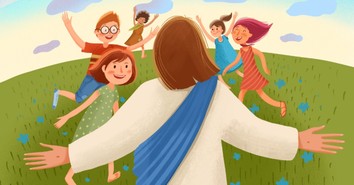4 Ways to Keep Easter Exciting for Kids Who Are Growing Up

Easter is fast approaching, and with it comes the long list of focuses. Easter egg hunts, candy, Easter programs, Easter services, Good Friday, Maundy Thursday, bunny rabbits, crucifixes, and a thousand mixed messages.
And, in the midst of it all, if you’re like me, you’re also realizing your children are no longer believers in the Easter bunny, are becoming more familiar with the violence and the miracle surrounding the cross, and maybe… maybe they’re even a bit lackluster in their excitement for the holiday.
This holiday has the potential to become less exciting the older we get.
Hold on, stick with me.
While as adults, as believers, and as people of faith, we find Easter to be full of deep spiritual meaning, eternal life-changing impact, and rich traditions, our children hit a point in their growing up years where exciting collides with boring and that equates to “blah”.
It’s irritating on one hand to even admit this out loud. But let’s be frank, there’s very few middle-school to high-school-aged students that I’ve worked with in my twenty years of youth ministry, who become emotionally moved and deeply impacted by the crucifixion or the resurrection.
To them, it’s more the slow death of the Easter fun (bunny, eggs, candy) because they’re “too old”, and the evolution into the solemn-faced, communion-taking adults who remain in solemn silence when they leave Good Friday evening services.
A kid’s holiday transposes itself into a boring adult tradition and somehow, the young person is caught in the middle.
This isn’t a place we want our kids to be, either mentally or spiritually. Easter is the most critical holiday to our Christian faith. It is the foundation of our eternal security, our spiritual life, and our covering from sin.
So how do we keep Easter not just exciting, but real for kids who are growing up?
1. Don’t Exclude Them
I chatted with a young lady who is a Sophomore in high school and asked her what she wished would be done for her as a teenager with Easter approaching.
She pretty much said, “don’t assume I don’t want to hunt for Easter eggs! It’s still fun!”
Okay. This may not engage her spiritual senses, but what it does do is continue to include the not-yet-grown-up pre-adult in the fun that is Easter.
We assume that they think Easter egg hunts are “stupid”, “boring”, or “dumb.” For some, this may absolutely be the case. But for many, it’s not.
So, hide some eggs with some candy, throw in an iTunes gift card, or send them on a virtual Internet “egg” hunt to find trivia answers in order to earn their candy. They’re still kids. Ask them if they want to be a part.
2. Engage Their Creativity
Easter can come with a lot of decorating. This is the time to engage your creative child’s instincts and really include them in helping make the holiday special.
Send your teenager to Pinterest and ask them to find two or three meaningful decorations they can make at home that help reflect the meaning of Easter. Supply them with the craft supplies and watch them go!
There are baking options for resurrection bread, fun projects with natural plant items that model the tomb and new growth, or window glass markers and templates for making your own stained glass.
As adults, we can ease up on having a magazine-worthy house filled with country-chic décor and exchange it for the meaningful imagery created by our older children.

Photo Credit: ©GettyImages/jacoblund
3. Start a New Tradition
This may be difficult for some of you who are very strict in your Easter observations. However, you can open up a wealth of ownership in your child’s spirituality when you ask them to give input in and/or craft a new family tradition.
My children love to “lead their own service”. We gather in the living room. We sing a hymn that my daughter plays on the ukulele, my son “preaches” a sermon, and they lead us in prayer and reflection.
So, it’s not the traditional Good Friday service at my place of worship, but to see the life in the eyes of my older kids as they share their faith from their perspective is beautiful.
So, what family tradition would your child wish to start? What would they do to make their faith real around Easter and to make it meaningful in their voice?
4. Talk to Your Young Adult
My young friend emailed me, “teens are afraid to make the first move when it comes to deep conversations, but usually that's exactly what they need daily.”
In short, she was saying that this is the time—the season—to sit down and have a heart to your heart with your kid. Ask them what their perspective on the crucifixion is? How do you believe the resurrection impacts your life?
What would the world be like if Jesus had never shed His blood on our behalf? What are your biggest questions about religion? Do you like Easter?
The questions can take on multiple forms. They can be simple, or they can be theologically deep depending on your child. But talk to them.
I believe we assume too quickly that our kids don’t want to talk to us. When we attempt it and get an eye roll or a heaved sigh, we also back away very quickly. Don’t.
Press forward, brave parental unit, and assume your child wants to be pursued by you.
In the end, you are responsible for building your young adults' spiritual foundation. You’ve spent the last several years since toddlerhood teaching them the basics. Jesus, the cross, the resurrection. Stories of Palm Sunday, and of doubting Thomas, Judas’s awful betrayal, and Peter’s heart-rending lies.
Break it down with your now older child. Who would have you been during this time?
I asked a teenage boy that and his response was shockingly honest: “I’m afraid I would have been doubting Thomas.” Now pause. Don’t judge that response. Embrace your child’s honesty.
“What is it about Thomas’ struggle to believe that you relate to?” And listen to your child slowly open up.
Or maybe, they will be very resistant. Obviously, we don’t want to lecture them to death, but we do want to give them opportunity. Honest opportunity.
If they decline it, then it’s on them. They can’t argue their parents never wanted to talk to them, never asked them what they thought, or never showed an interest.
All in all, though, I think you’d be surprised how many young adults simply want to hang out with you.
We can make Easter a continued celebration of life and grace for our kids. They don’t outgrow Easter, but Easter can outgrow them if we allow it.
It’s on us, the parents, to continue to pave that foundation on which your child’s faith will be built and even how their relationships with family will form through Easterly traditions and family fun.
Because let’s face it, if we’re honest, we may be old and stodgy, but we all love some Easter candy too, and Jesus doesn’t have to be a boring, rote tradition.
He can be alive, because He is alive.
Engage your young adult this Easter and watch them breathe in that redemption story.
Photo Credit: ©GettyImages/LightFieldStudios
Jaime Jo Wright is an ECPA and Publisher’s Weekly bestselling author. Her novel “The House on Foster Hill” won the prestigious Christy Award and she continues to publish Gothic thrillers for the inspirational market. Jaime Jo resides in the woods of Wisconsin, lives in dreamland, exists in reality, and invites you to join her adventures at jaimewrightbooks.com and at her podcast madlitmusings.com where she discusses the deeper issues of story and faith with fellow authors.
Originally published March 27, 2024.





